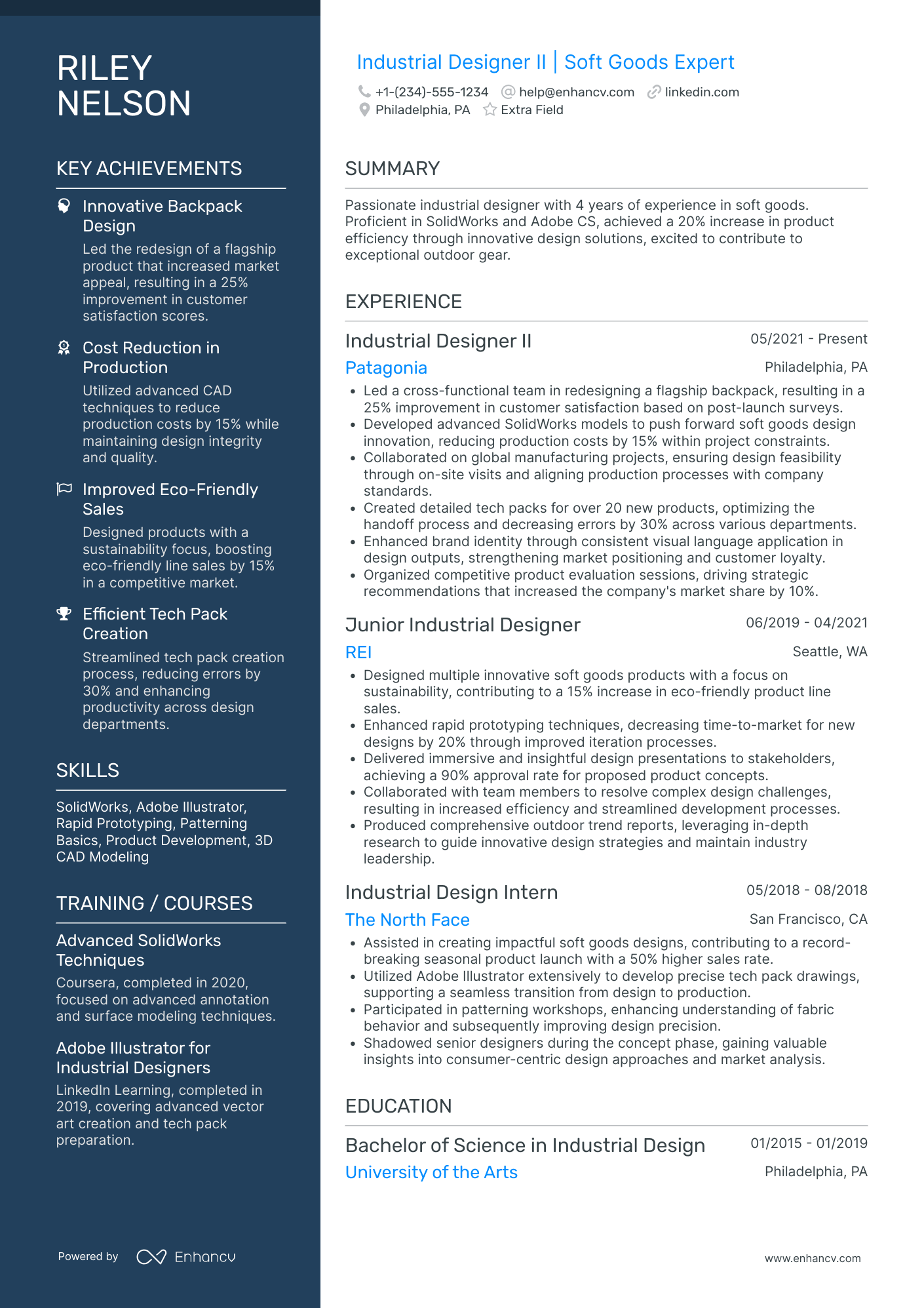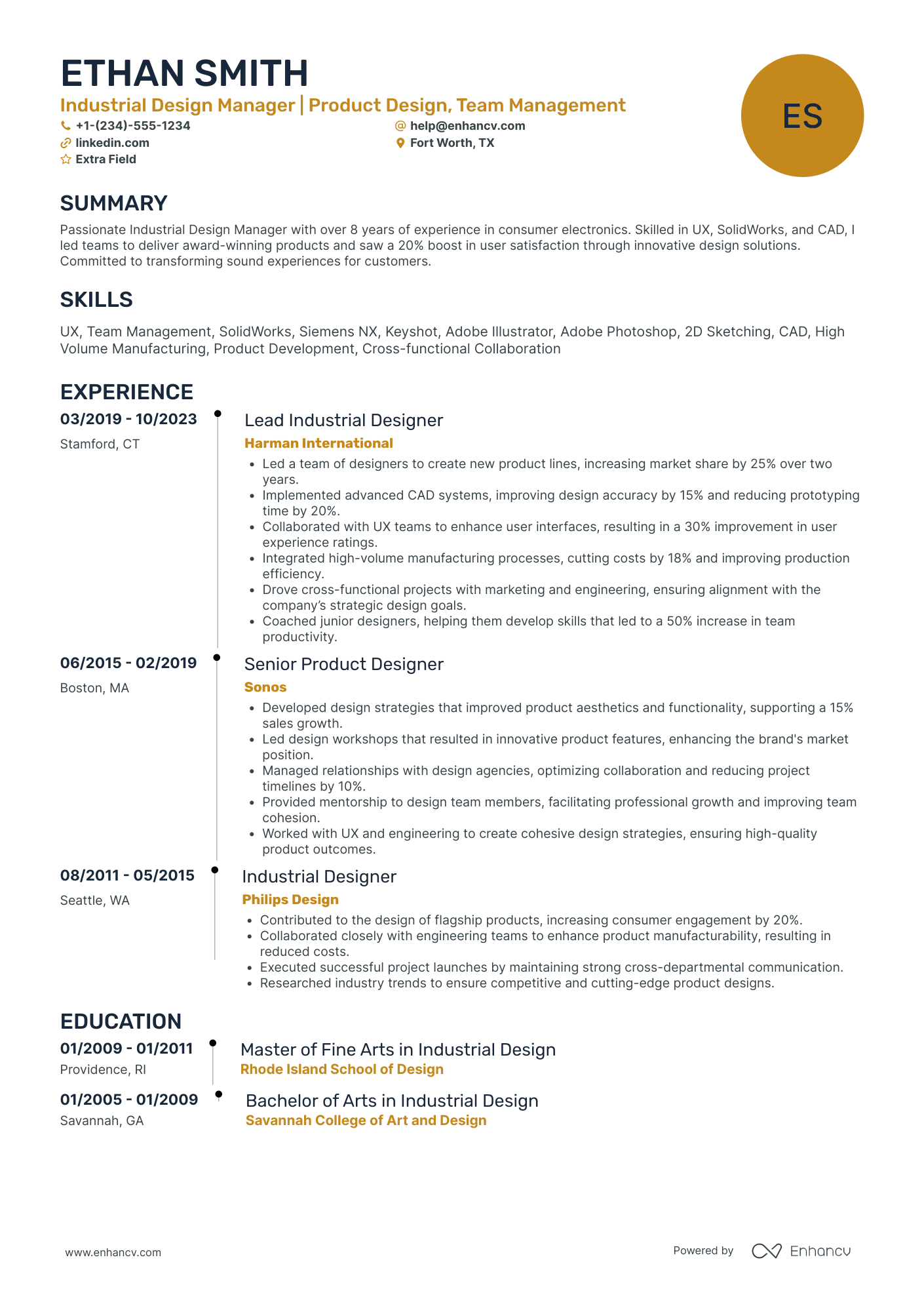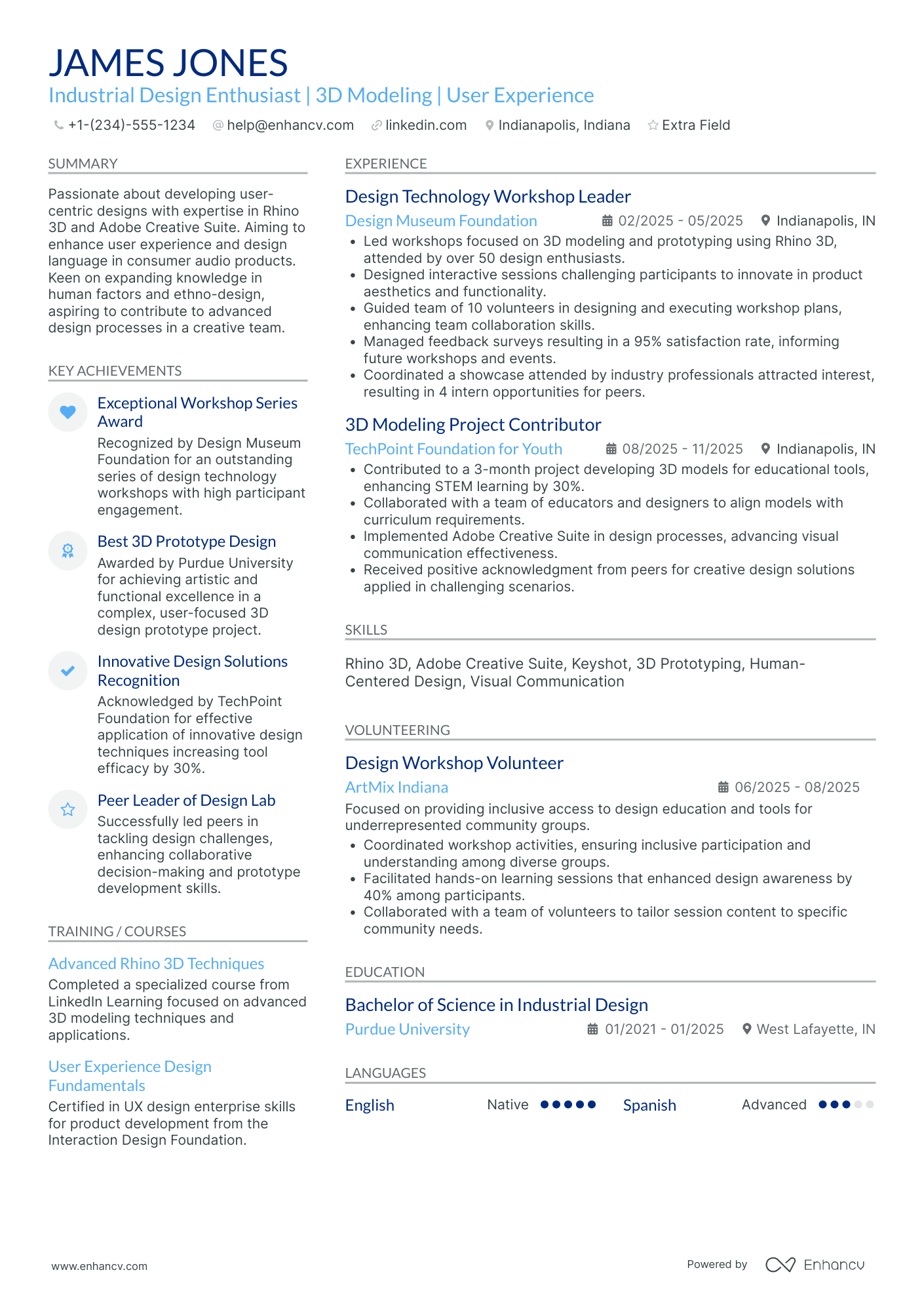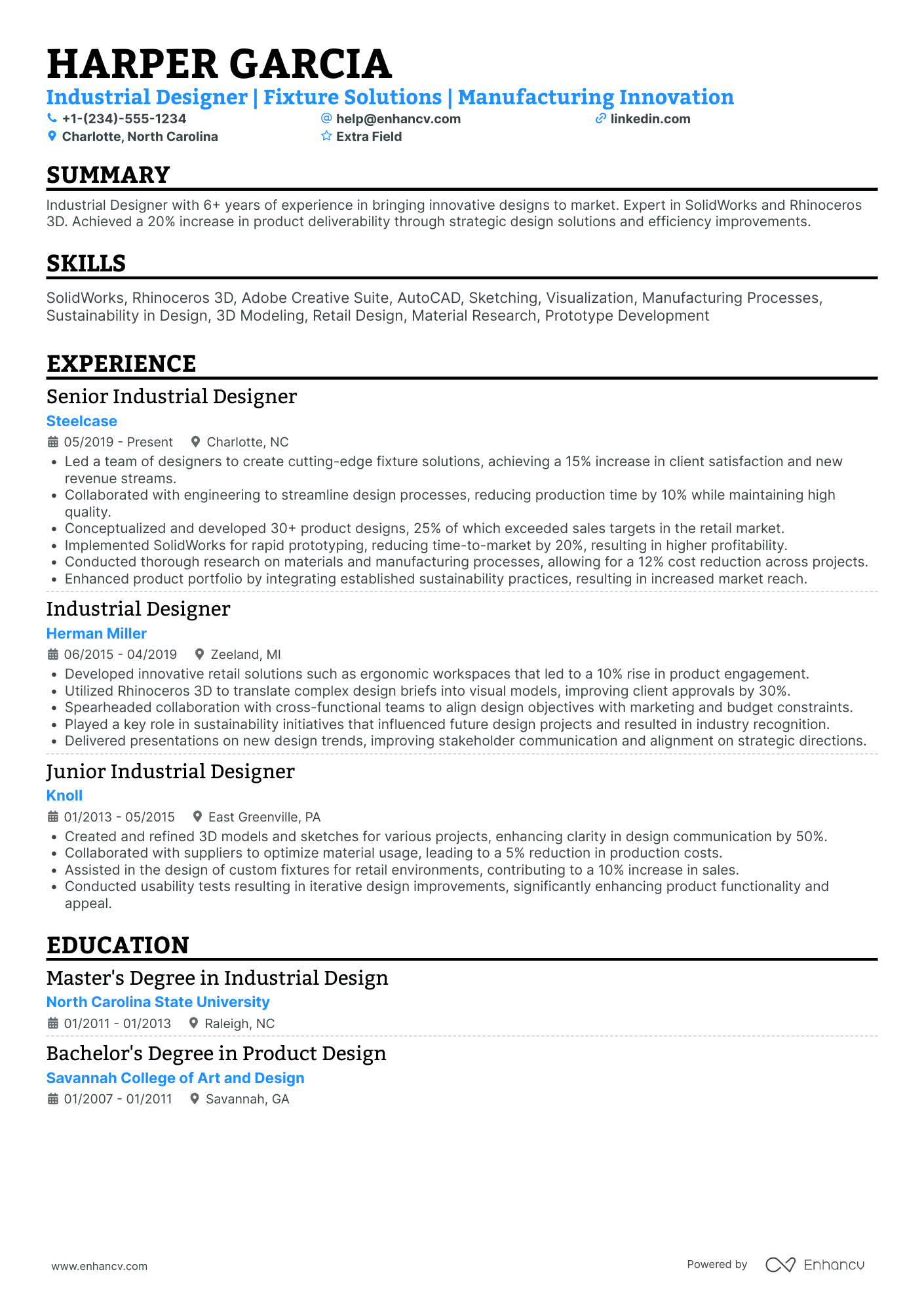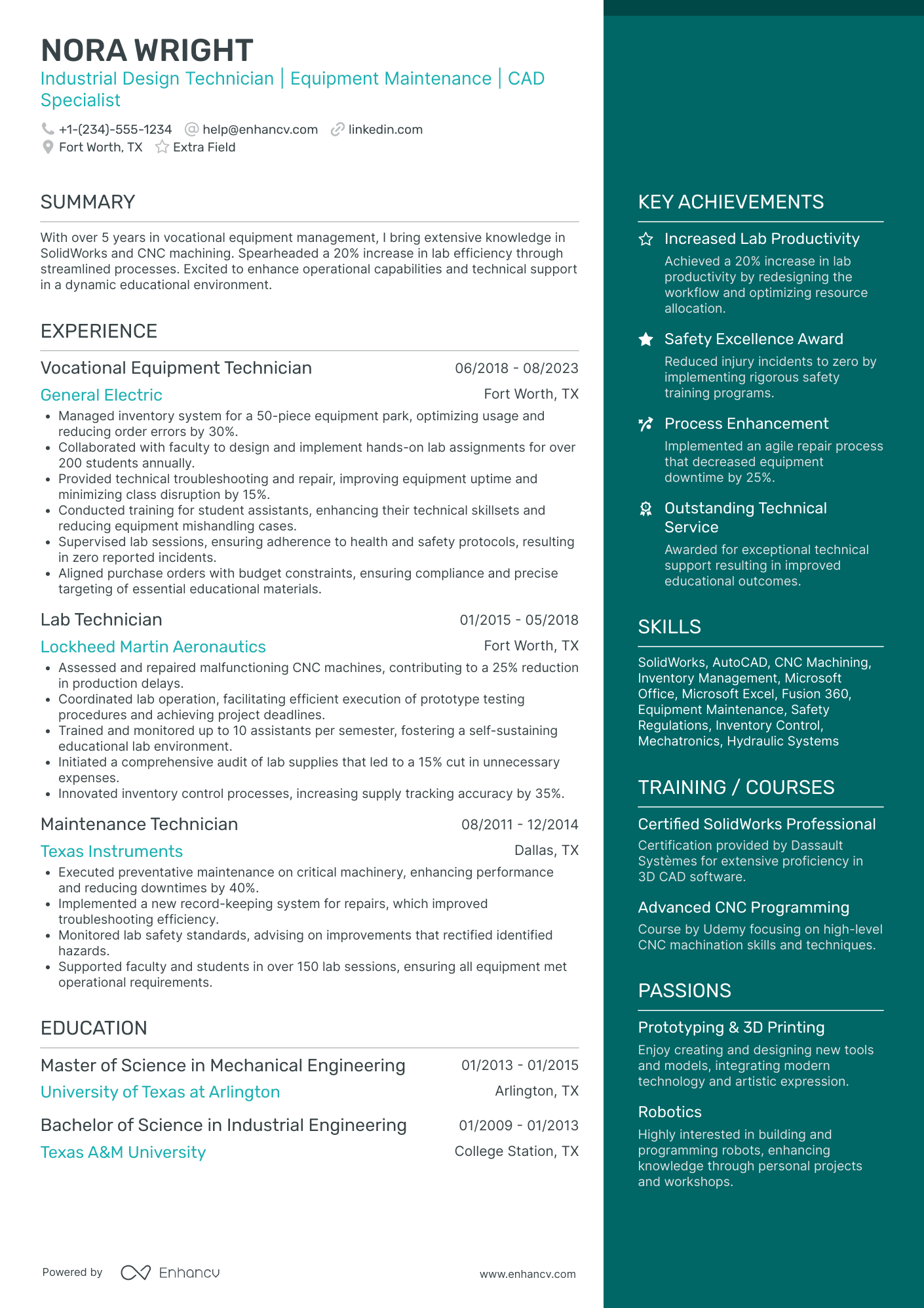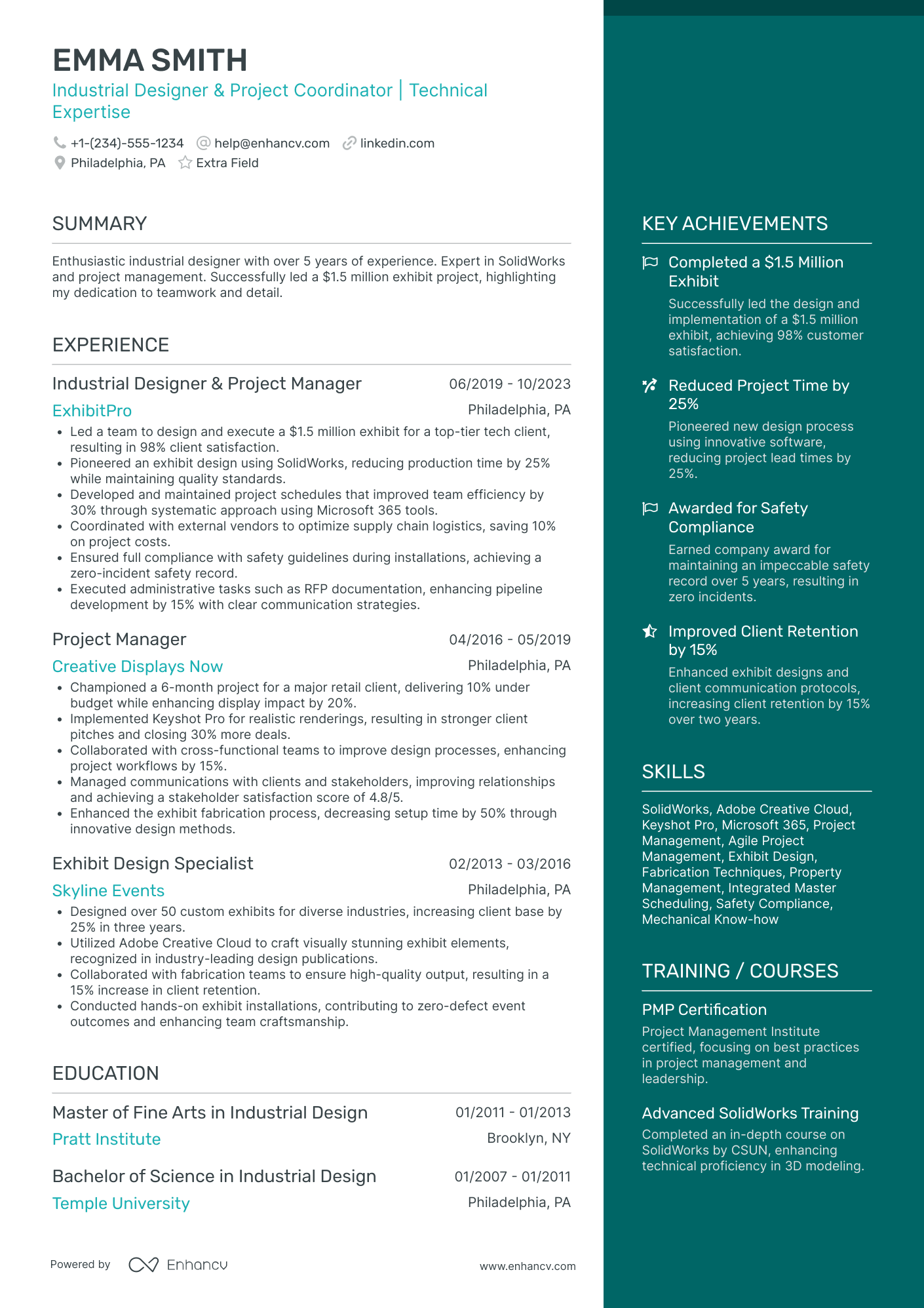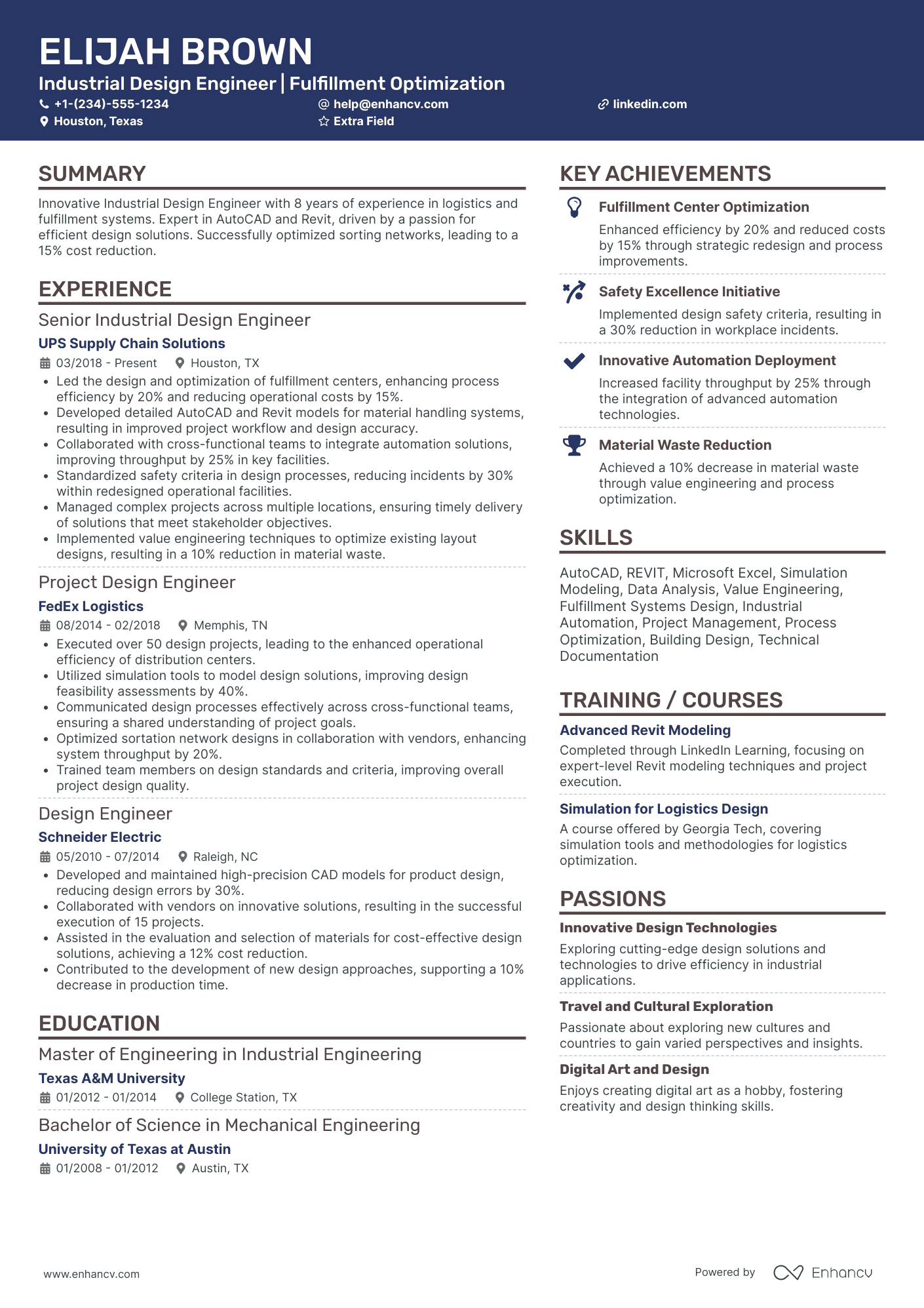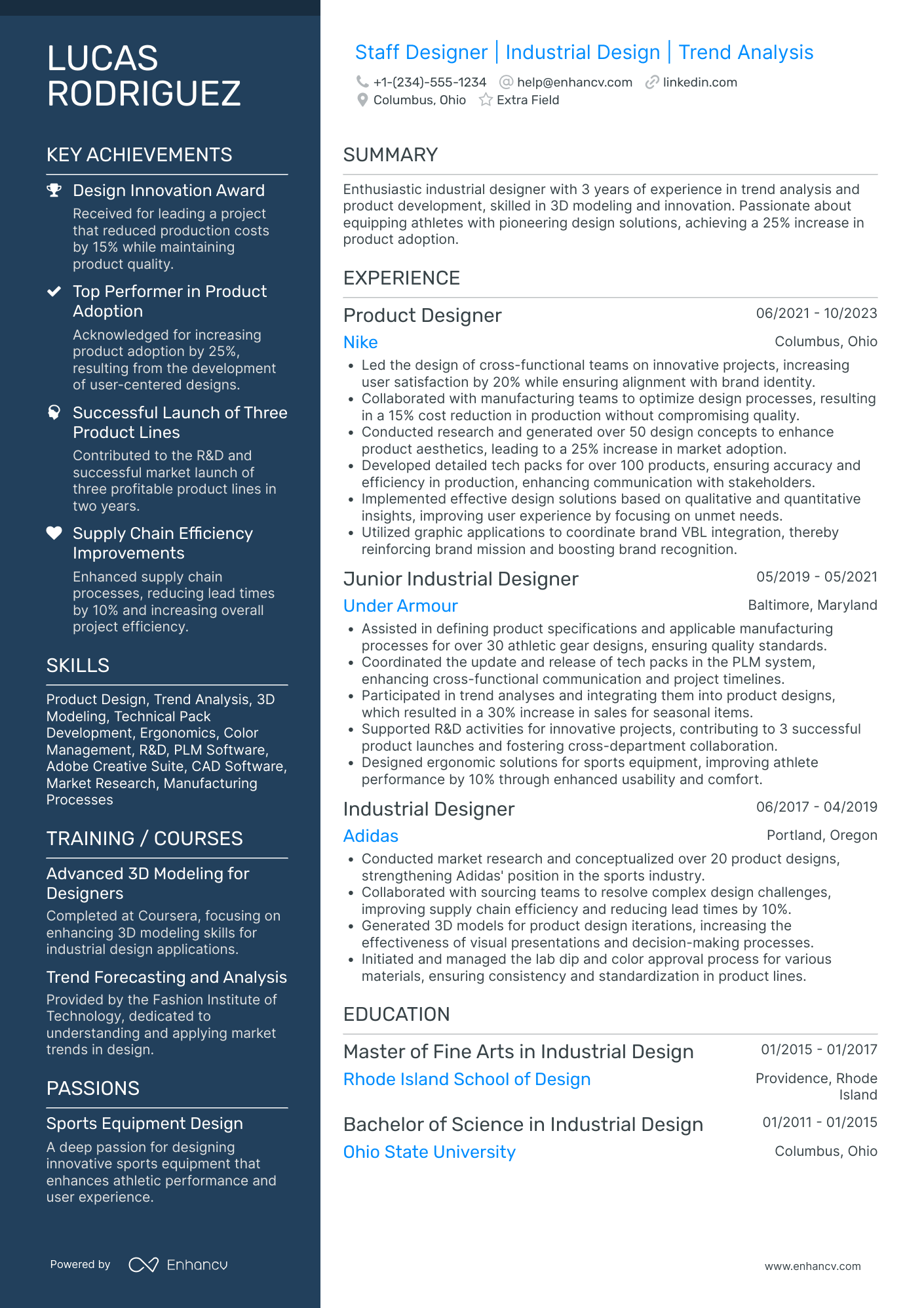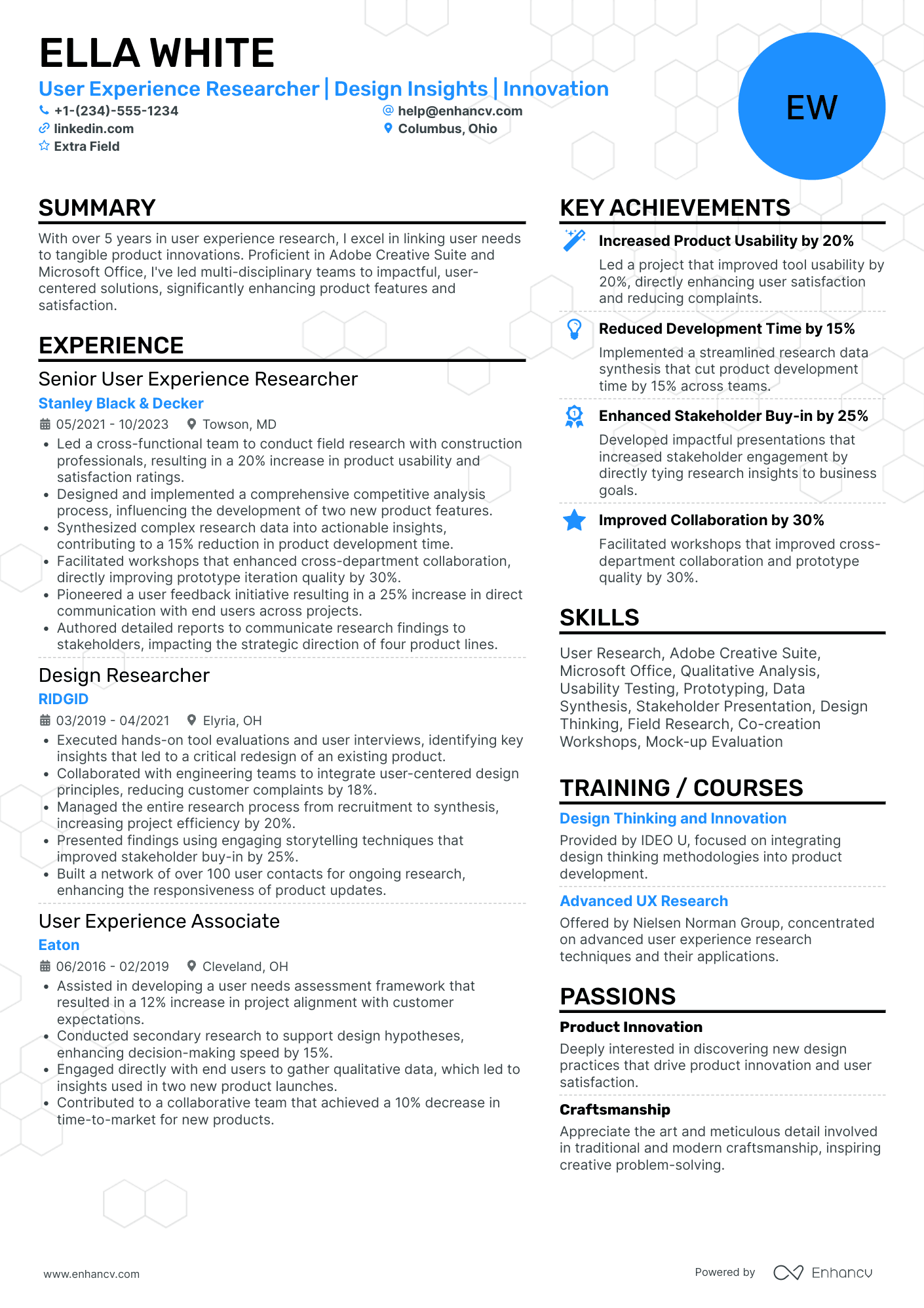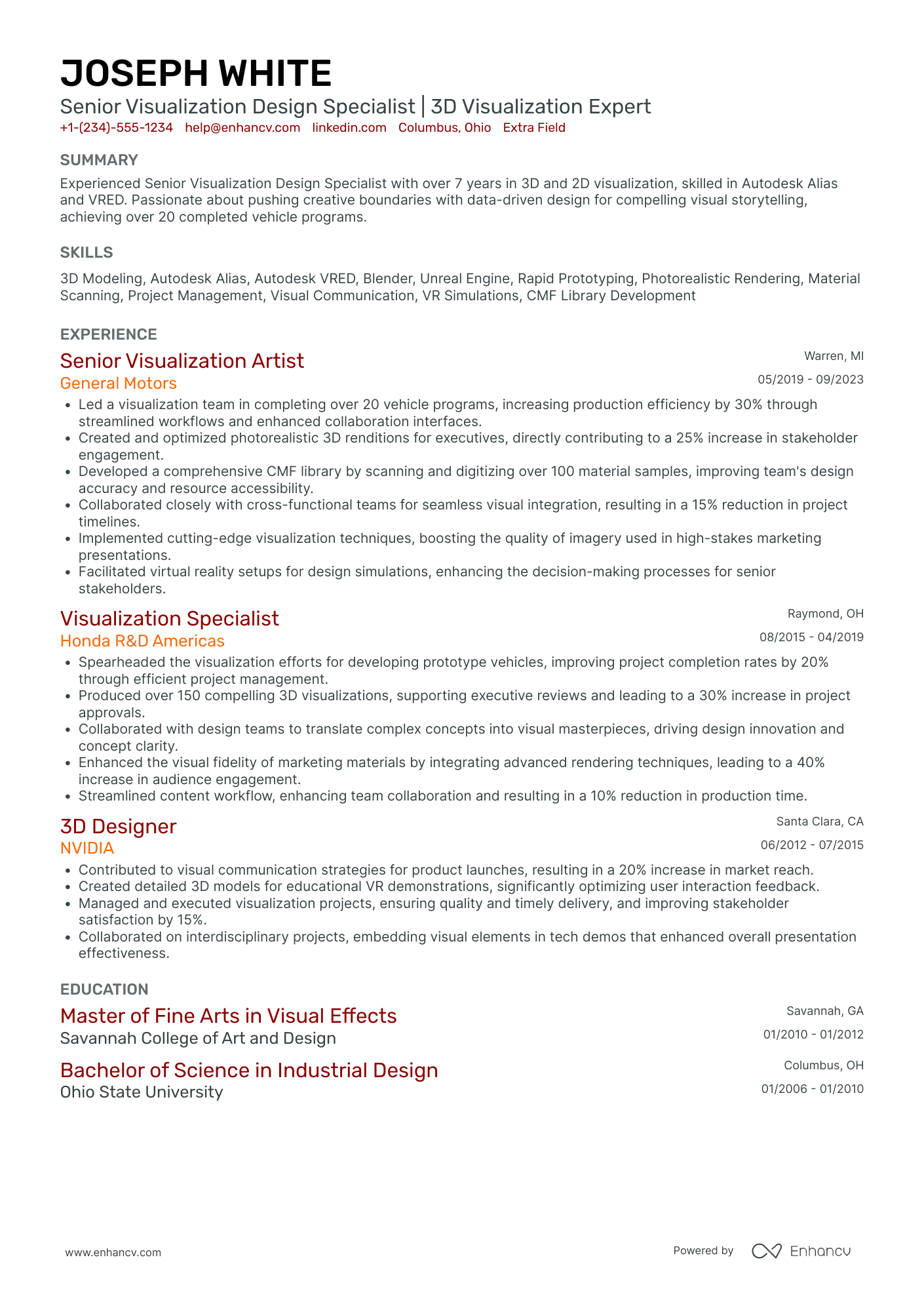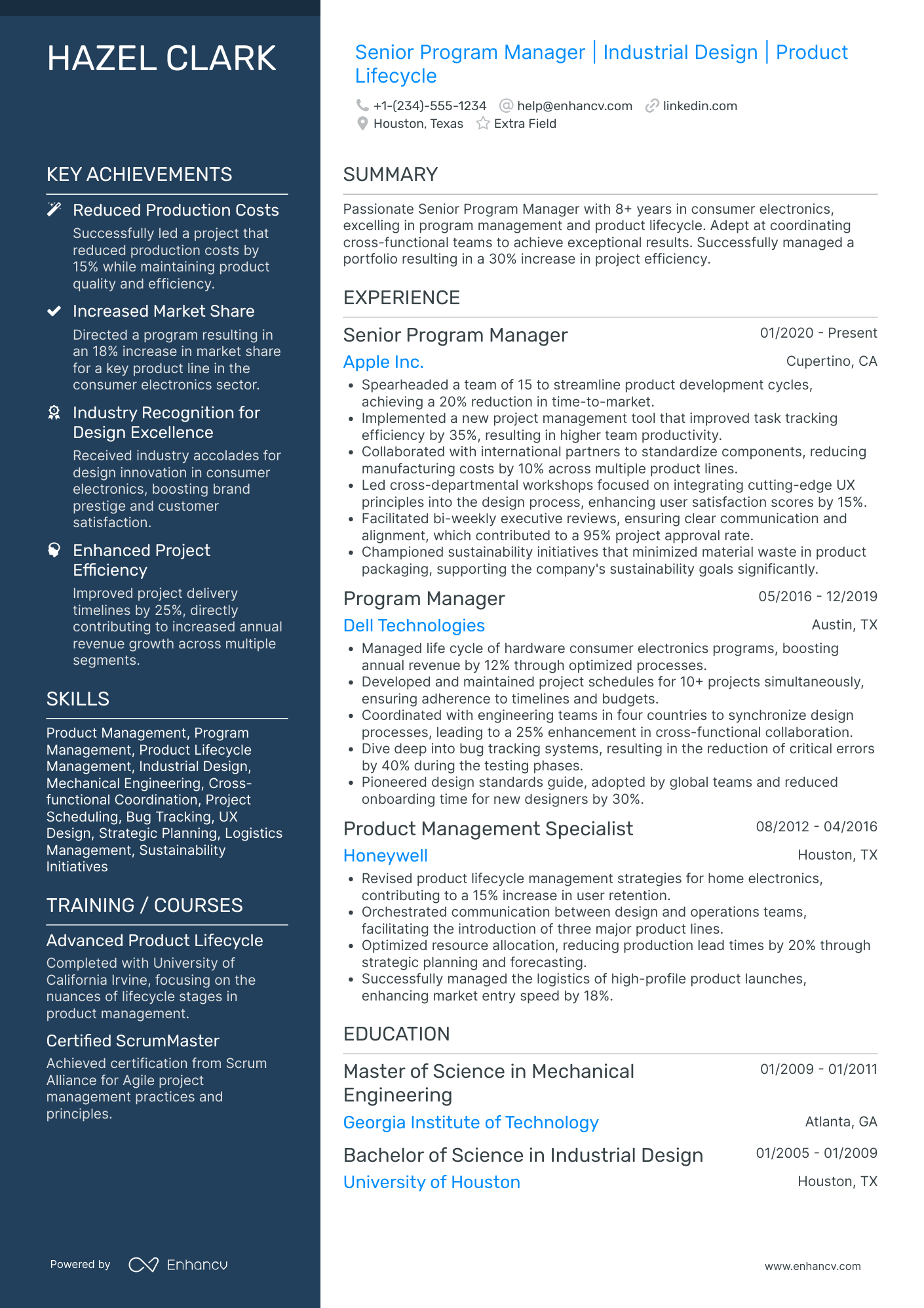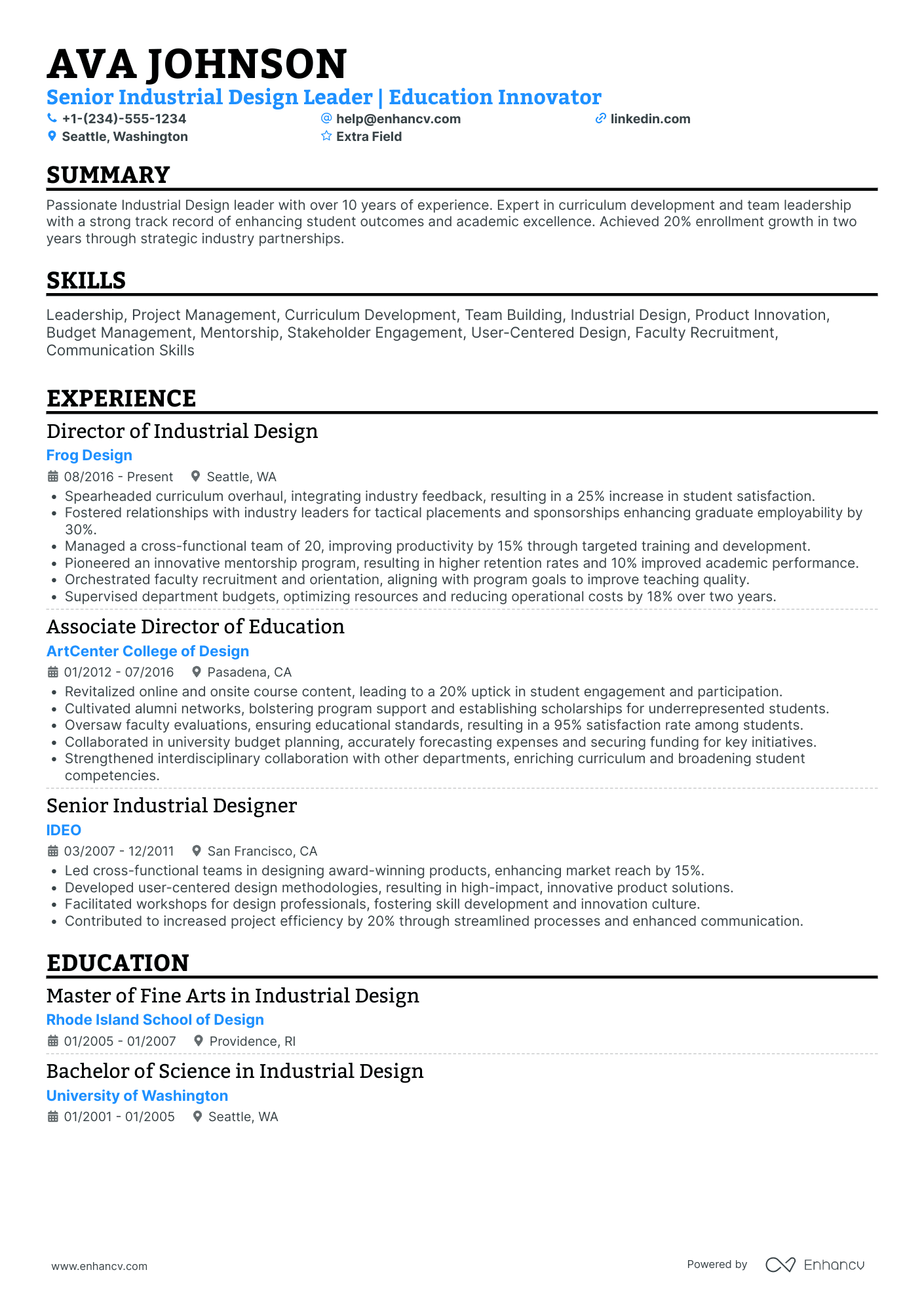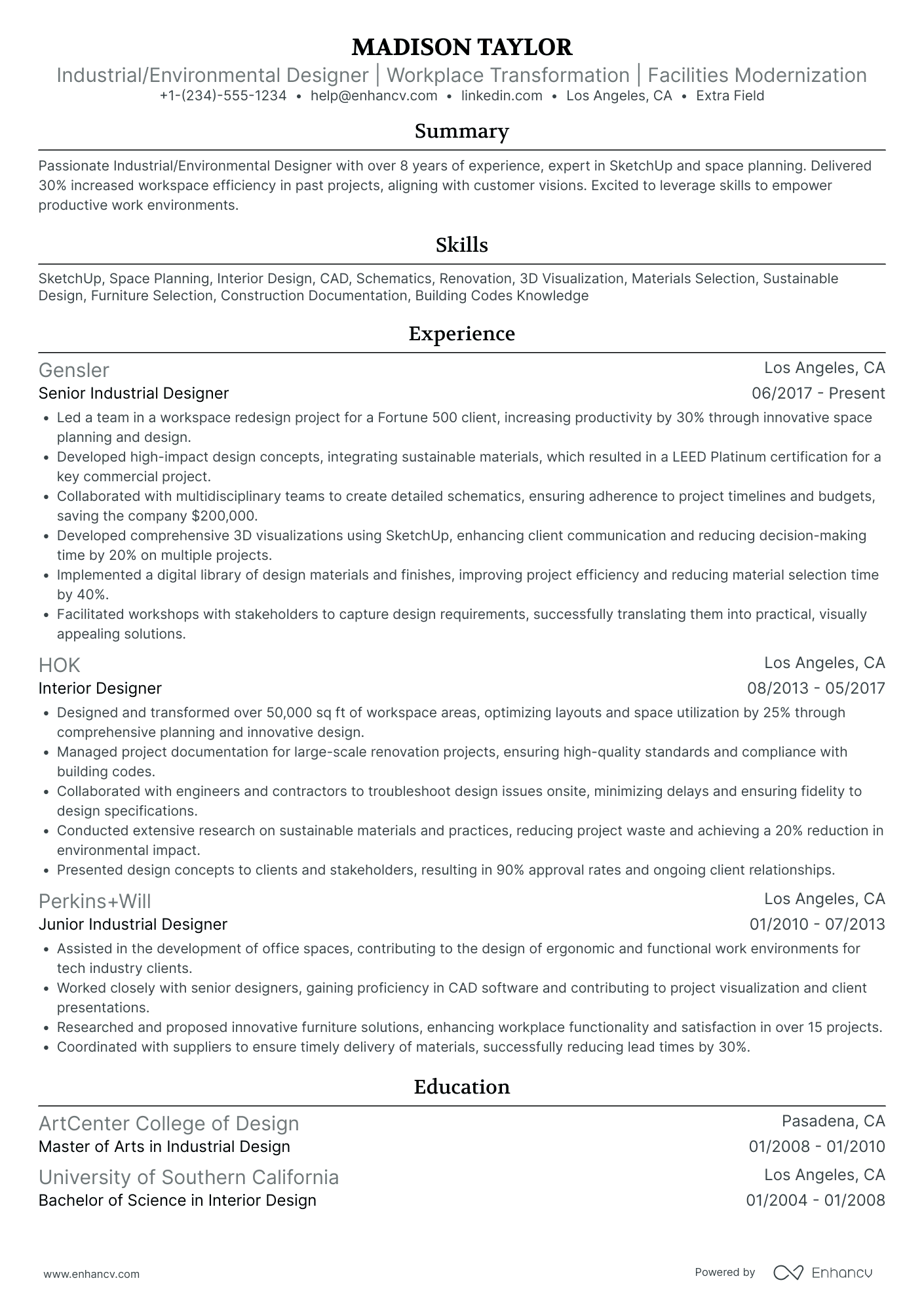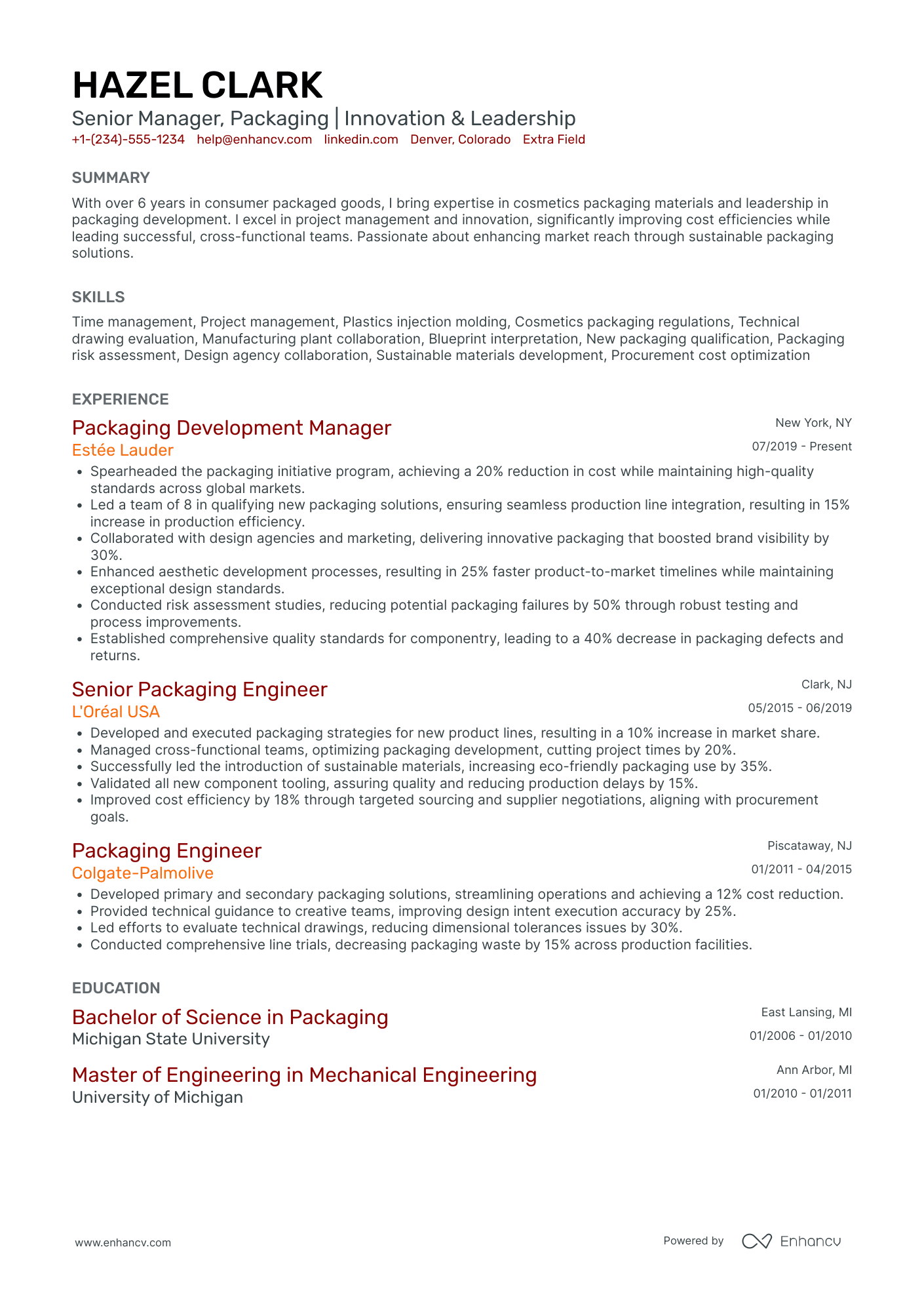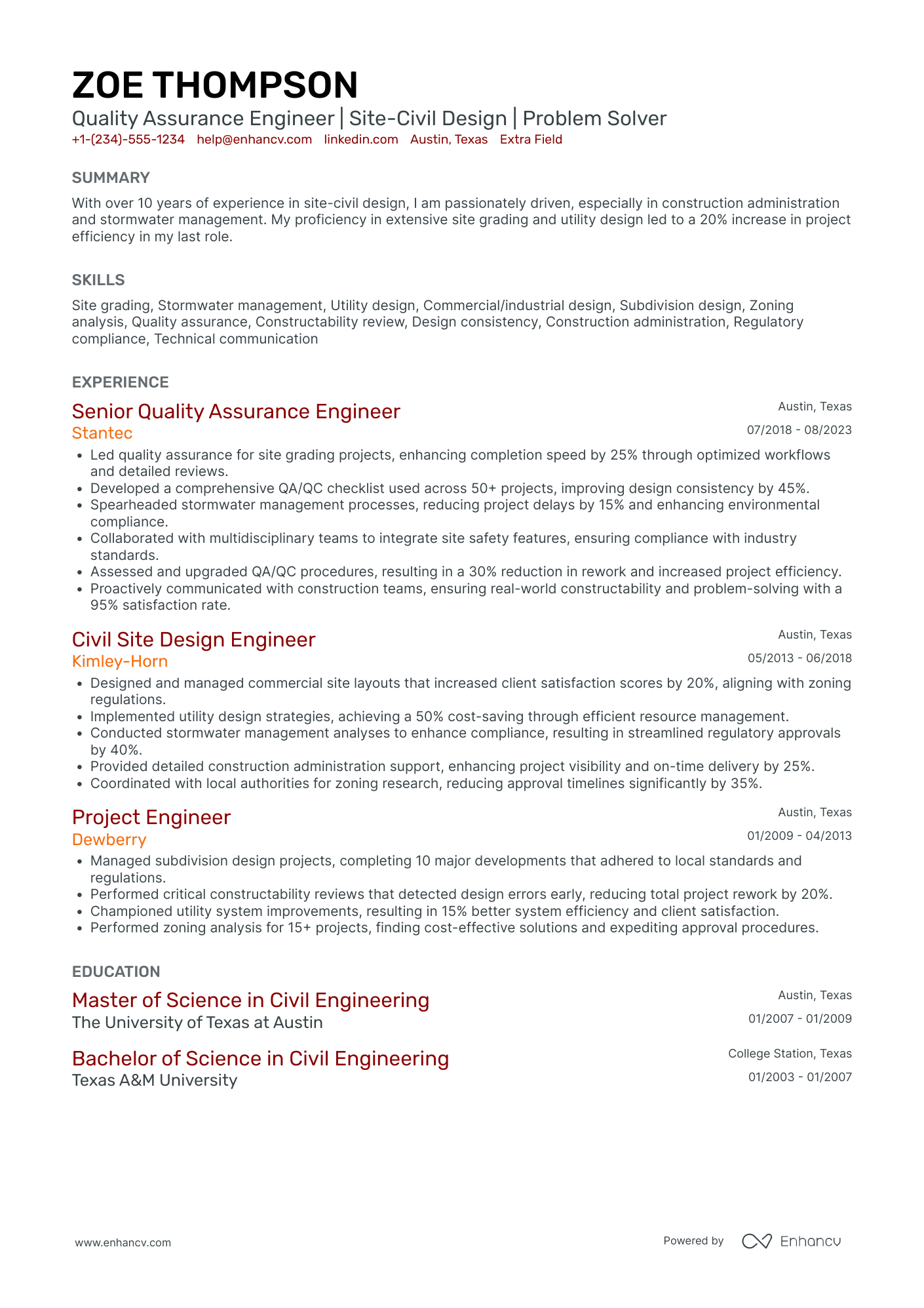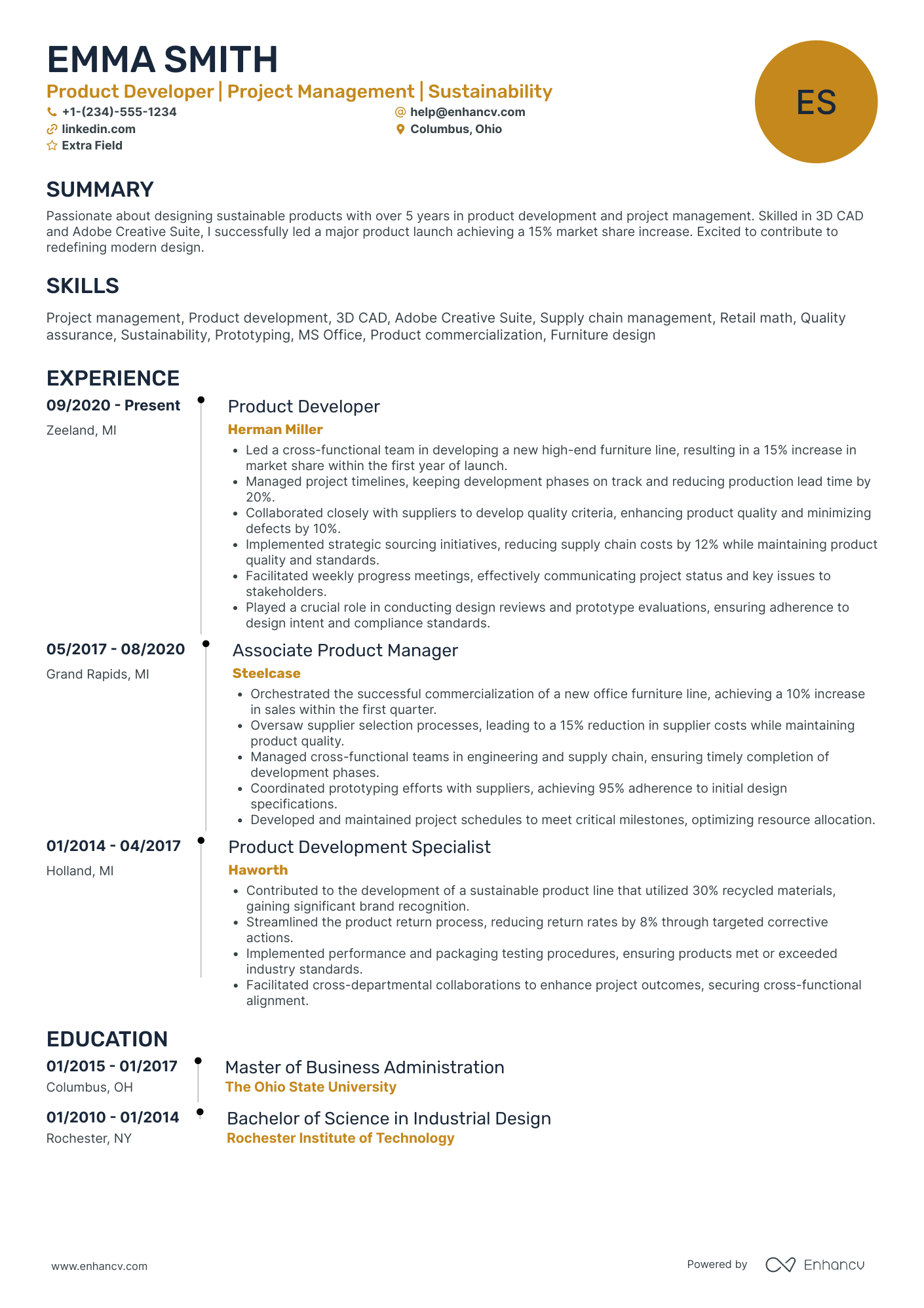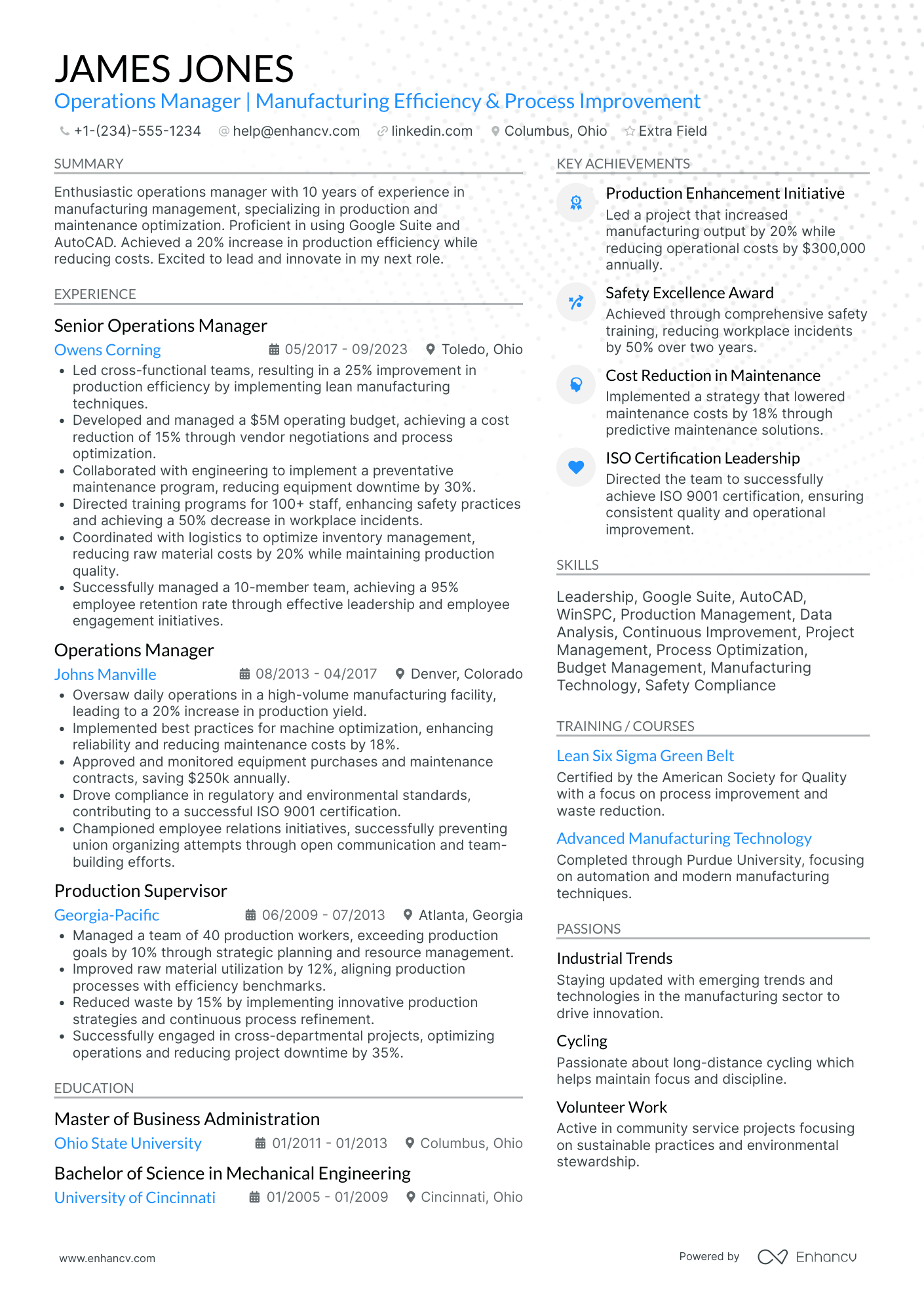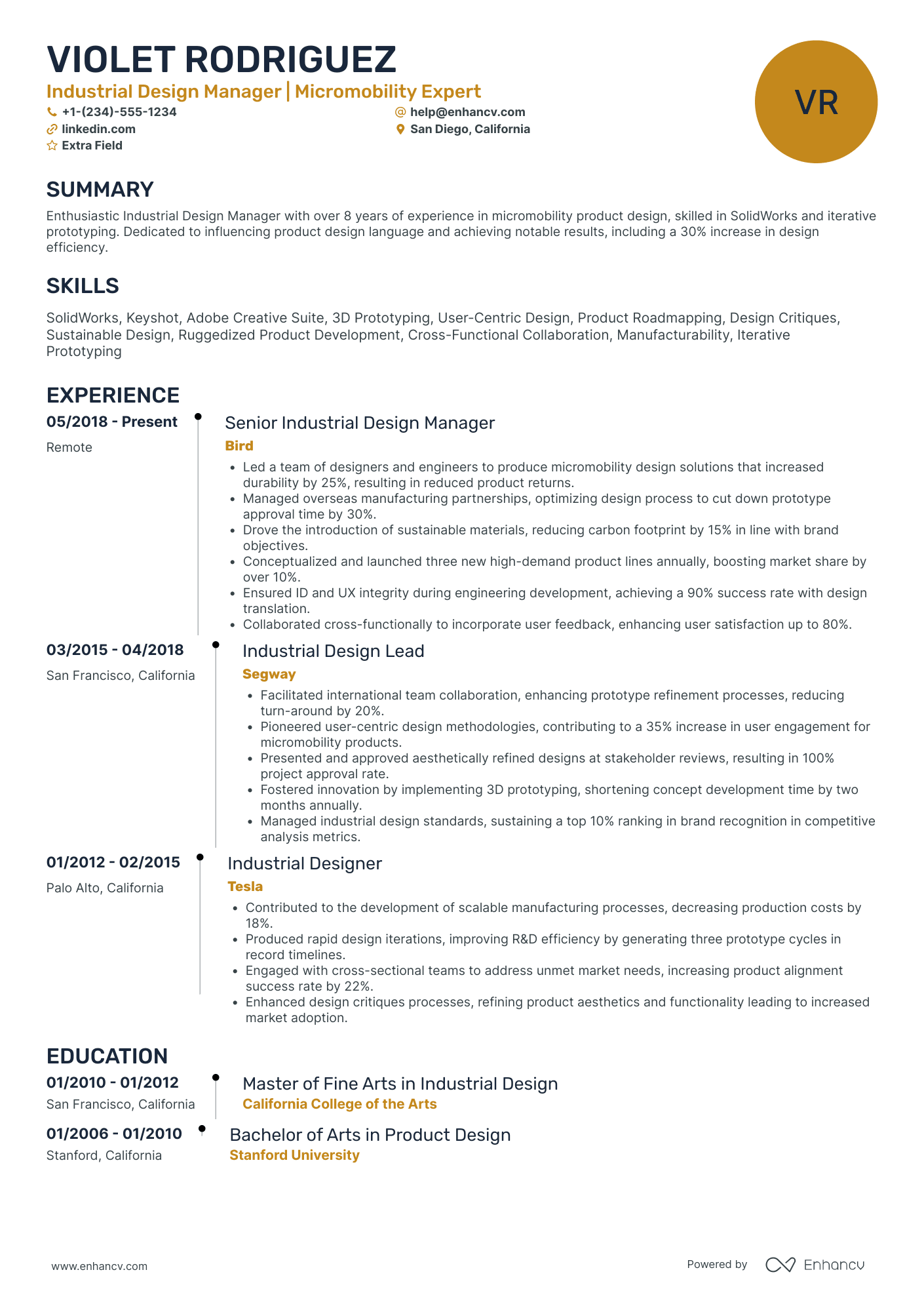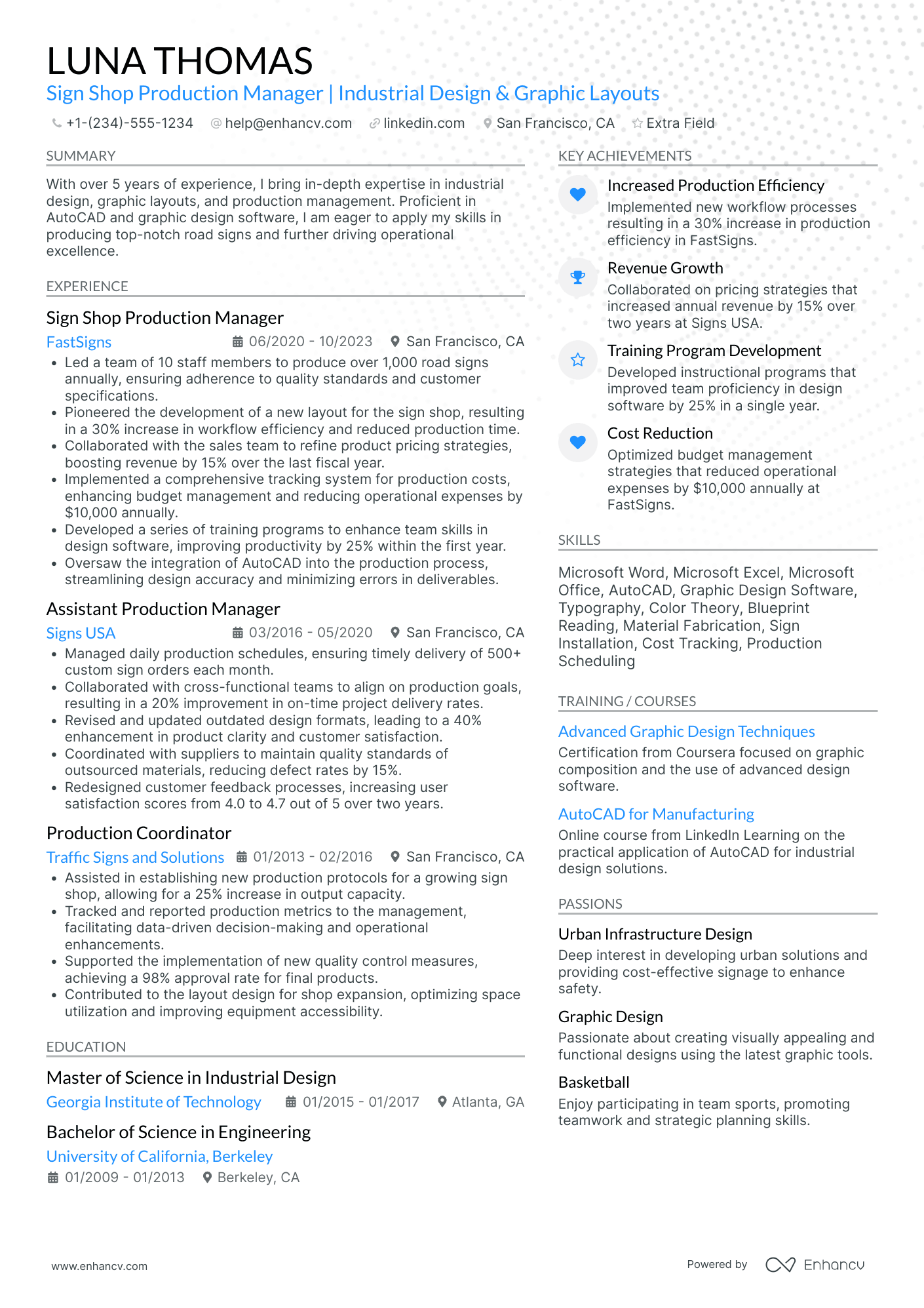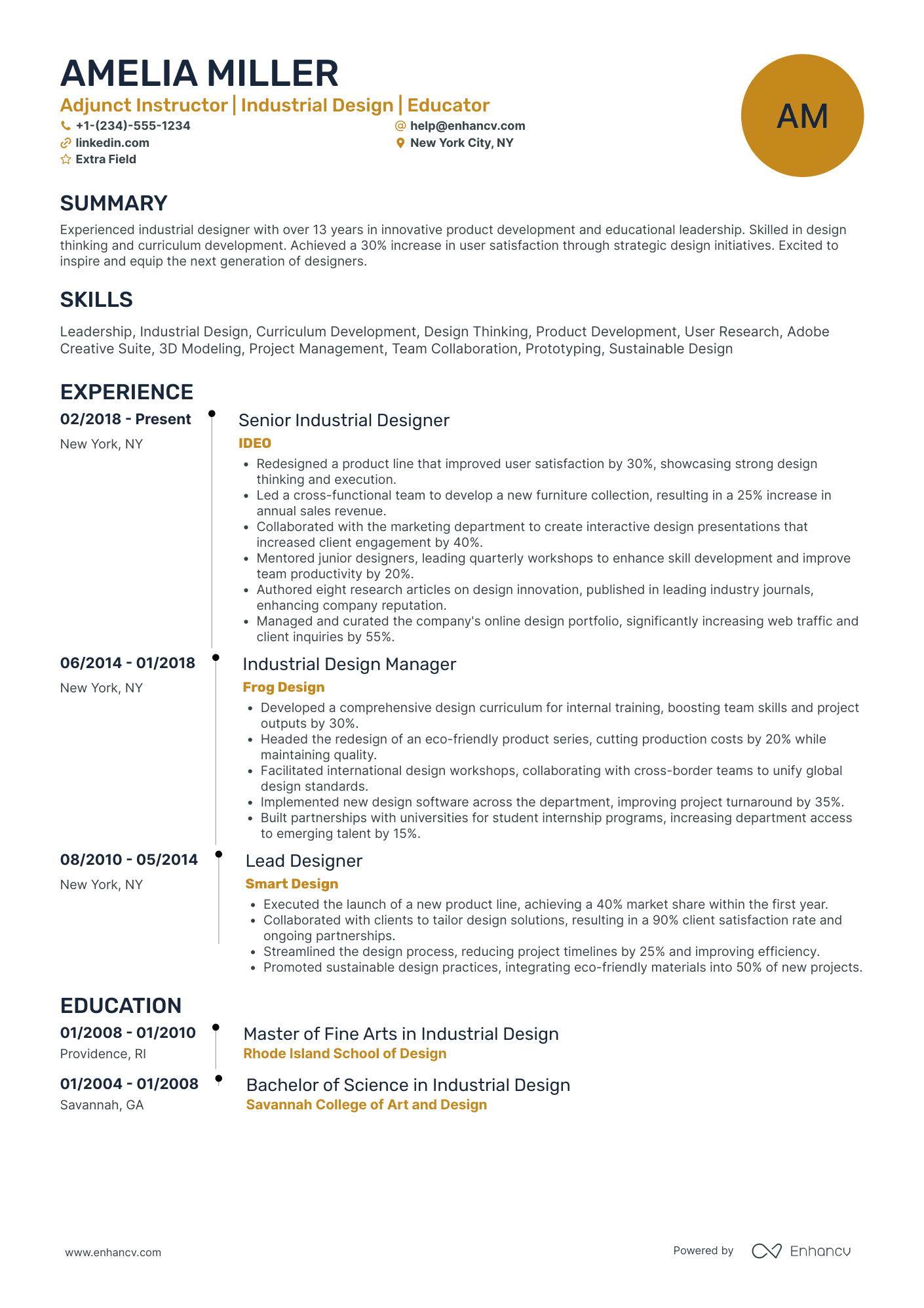You’re about to write a great industrial design resume.
But first, let’s talk about this issue.
Industrial designer resumes should answer questions like these:
“Give an example when your creativity and critical thinking helped you solve a problem.”
“Did you participate in new product planning or market research?”
“Have you modified designs to adhere to customer specifications?
If recruiters can’t get a sense of these and other questions in advance, you won’t get a callback.
This makes your resume a focal point in your application.
Get it right, and you’re in for an interview. Mess it up, and it ends up in the pile of rejects.
Fortunately, you’ll learn in less than 15 minutes how to write your job-winning resume.
What you’ll learn from this industrial design resume guide
- Learn what makes a perfect resume header that grabs a recruiter’s attention from the get-go.
- How to make sure your career summary is written for impact.
- Compare and analyze right and wrong real-life industrial designer resume samples.
- How to include notable results from your job history, instead of a simple tasklist.
- How to select and showcase skills that match your experience.
How to write an industrial design resume
What separates a concept artist from an industrial designer is the ability to go from a drawing to real product that solves a problem.
If you’re applying for a senior industrial design position, the products you’ve brought to market are essential.
However, don’t make the mistake of talking at length about the project on the resume, and fail to show accomplishments and ideas you came up with. Here is a list of another common resume mistakes and how to avoid them.
There’s a risk to come across as a participant, not as a resource.
What if you are an Entry-Level industrial designer and your products have yet to make it to store shelves?
You might be tempted to add fancy skill bars featuring everything from CAD software to client relationships.
But, they make little sense without proving you’ve got them.
Let’s first start with picking out the right resume layout.
How to select an impactful industrial designer resume layout?
Resumes typically follow three types of layouts:
- Functional layout - It focuses on your skills and traits. It’s brief and to the point, but usually lacking much creativity or storytelling.
- Reverse chronological - It focuses on your experience starting from your most recent job or project and going back in time.
- Hybrid - It mixes the two above, focusing on the aspects most relevant to the particular application.
For a Senior industrial designer resume, the reverse-chronological layout will allow you to display the information most relevant to the specific position at the top.
For an industrial design Student resume, the hybrid layout will give you more space to expand on your limited experience.
Don't forget these important industrial design resume sections
- Resume Header
- Portfolio link
- Work experience
- Education
- Digital skills
- Awards & achievements
Writing the perfect industrial design resume header
Don’t be offended if your recruiter doesn’t remember your name.
Ideally, you want them to remember your portfolio, which defines you as an industrial designer.
2 industrial design resume header examples
The above header fails to make a good first impression. There’s no consistent contact data, plus, the portfolio link is missing.
That’s a header that opens up the doors to your background just enough to hook a recruiter's attention.
Pro tip
Make sure to include a link to a digital version of your portfolio right after your name.
Otherwise, keep your resume header simple. Include your name, title, address, phone and email and strip out all other distractions.
How to make your industrial design summary stand out
industrial designer job ads might attract thousands of resumes.
Hiring managers don’t have to read every single resume that ends up on their desk.
Time is of the essence and they often look up for a career summary to see if the resume is worth their time.
It’s an impactful introduction paragraph jam-packed with facts about you employers will be looking to read.
This is what they usually search for in summaries:
- Years of experience
- Industry expertise and work projects (Mention your experience with CAD and 3D design)
- Job accomplishments that show your true value proposition (e.g. Increased product checkout RPV by 40%).
Let’s see how it’s done in practice.
Optimize your resume summary and objective for ATS
Drop your resume here or choose a file.
PDF & DOCX only. Max 2MB file size.
2 industrial design resume summary examples
Unfortunately, this summary is not focused and shows the applicant doesn’t really know what they are doing.
This summary means business.
The designer has featured total experience and mentioned different niches they’ve worked in.
Award-winning product design is an actual proof of applicant skills.
"Awards on Resume: How to List Them on Your Resume"
Here’s what hiring managers look for in an industrial design resume experience
The single biggest mistake you could make on your industrial design resume is to talk vaguely about previous job duties.
You must also list accomplishments, AND, quantify the results.
- Did you minimize material waste by modifying product geometry?
- Did you decrease material use by adding a support structure?
- How many products did you manage in your production line?
- Did your products lead to company’s revenue increase?
These are just a handful of questions recruiters might have for your previous experience.
Let’s demonstrate in practice how to ace the resume experience section.
Industrial design resume experience examples
- •Performed product testing, and social media branding and marketing
- •Conducted successful orders of clothing and artwork
- •Conducted sprints to develop a startup idea and product design
- •Product sales contributed to an increase in company recurrent revenue
- •Managed a line of specific exclusive products
These bullets might look good at first sight.
But in reality they speak nothing about the candidate’s personal contribution.
Recruiters want to hire someone who stands out with results.
Let’s look at the second example.
- •Performed product testing, and social media branding and marketing, increasing the user base by 25%
- •Conducted successful first orders for 750 pieces of clothing and artwork
- •Conducted sprints (with the team of 4 people) to develop the startup idea and product design for a $1 mil in sales product
- •Product sales contributed to 25% of company recurrent revenue
- •Managed the entire line of over 50 customer specific exclusive products
The same bullet points now show what improvements you implemented in the company during your work.
Recruiters want proactive and motivated industrial designers. Not-my-job attitude is rarely welcome and you don’t want your resume to strike the wrong impression.
Emphasizing skills on industrial design resume
industrial design is a combination between art and engineering.
Recruiters will want to see your good sense of color, balance and proportion, but also how you can combine these with engineering and make a sustainable and usable product.
Seeing that you are good with marketing, project management and quality assurance can tip headhunters off that your designs will attract more clients for the company.
That said, some industrial design skills are more sought after than others. So make sure you mention them in your resume skills section.
Top 8 industrial design skills to add to your resume
- CAD and technical drawing
- 3D design, rendering, and animation
- 2D graphic design
- Sketching
- Drafting
- Painting
- Drawing
- Prototyping
- 3D printing
- Modeling and sculpting
- UI/UX
- Packaging Design
- Market Analysis
These skills are an essential part of your job. They are a must-have in most industrial design positions.
You can simply list them, or add a certificate or relevant work experience where you demonstrate you mastered them.
11 soft skills for industrial designers
- Design thinking
- Creativity
- Active listening
- Problem solving
- Research
- Communication
- Presentation
- Reading comprehension
- Speaking
- Persistence
- Independence
These skills are critical. Getting a design approved requires solid reasoning and well-crafted presentation.
However, don’t just blindly state them. Show real-life scenarios where they helped you perform a task better. Here’s a simple way to do that.
What’s more, automated systems may reject your application if they don’t detect the skills they’re programmed to look for.
Pro tip
Mixing digital and physical design skills on your resume can show that your designs have improved relevancy and life expectancy. Learn basic programming skills to complement your traditional graphic design skills and make yourself more relevant in the long term.
Should i add an education section to my resume?
At the bare minimum, you should list your university or college and your major.
If you’re fresh out of college, your grades and projects will be the biggest factor in the decision to hire you.
Education will play only a supporting role for Senior industrial designers.
Make sure that it follows the same rules we defined in the work experience section. In general, here’s what headhunters will be happy to see in education section:
- Major you’ve completed;
- University projects;
- Any awards or achievements;
- (but only list it if it’s higher than 3.2).
How to position an awards or achievements section in industrial designer resume?
If you received a major award for your work, for example:
- Red Dot
- iF Design
- Good Design Award
- International Design Excellence
…then yes, absolutely include an awards section.
Key takeaways to remember when writing your industrial designer resume
Now that you’re gotten to the end of our industrial designer resume guide, let’s summarize what you’ve learned:
- Design your resume like you design a product - Who is your target audience? What do they need to see?
- Your industrial design portfolio is your biggest selling point - include it at the top of your resume.
- Summarize your experience and skills in a few short sentences. Be brief and concise.
- Talk about your work, but emphasize on the impact you’ve made and the success of your products.
- Find a space saving layout that will allow you to list all relevant skills on your resume.
- Awards and certificates may be a great selling point. Consider allocating them a small amount of space.
Industrial Design resume examples
By Experience
By Role
